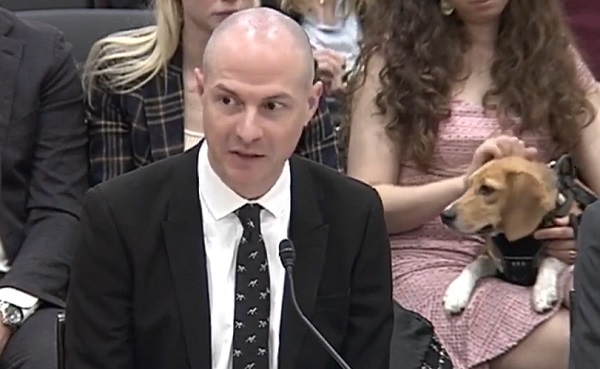Business
Dr. Fauci accused of wasting millions in taxpayer dollars on ‘transgender animal experiments’

From LifeSiteNews
The days of animal testing may be numbered, having been found to be less reliable than other methods of research.
Experts speaking at a Republican-led congressional hearing revealed the shocking news that at least $10 million had been wasted by government health agencies on “transgender animal testing” and that the number was likely closer to a quarter billion dollars or more.
Justin Goodman, senior vice president of the White Coat Waste Project, shed light on the exorbitant waste of American tax dollars on barbaric animal research that has prioritized woke societal trends over scientific outcomes.
“In our analysis, Dr. (Anthony) Fauci funded about 95% of the transgender animal experiments,” Goodman said.
Goodman told members of the Subcommittee on Cybersecurity, Information Technology, and Government Innovation, chaired by Republican Rep. Nancy Mace of South Carolina, that in his estimation $241 million has been spent on transgender animal testing, adding, “I would say that is the floor, not the ceiling because the information on federal databases is pretty incomplete.”
He described the nature of the transgender experimentation inflicted on the animals:
In a lot of these cases, there are involved mice, rats, monkeys who are being surgically mutilated and subjected to hormone therapies to mimic female to male, or male to female gender transitions … gender-affirming hormone therapies, and then looking at the biological, psychological, and physiological effects of the gender transitions, looking at the effects of taking vaccines after you’ve transitioned these animals from male to female or female to male, looking at the size of their genitals changing after you’ve put them on estrogen or testosterone therapies to transition them.
Rep. Mace explained – and Goodman confirmed – that “DEI grants” included “$1.1 million spent to find out if female rats receiving testosterone therapies to mimic transgender men were more likely to overdose on a party drug commonly used in the LGBTQ community to induce drug-fueled ‘chemsex.’”
Goodman said that the reason the public doesn’t know about these sadistic experiments is that “You essentially need a degree in information technology to navigate the federal spending databases to find any of this stuff.”
“It’s by design,” he added.
Fauci’s barbaric animal testing could lead to a new, deadly pandemic
Goodman went on to point his finger squarely at Dr. Fauci and his U.S.-funded virus research at China’s Wuhan lab and warned about dire future public health risks of continuing with outrageous animal studies.
“We’re flirting with disaster if we continue to fund dangerous virus research,” Goodman said, “like in Colorado where Fauci greenlit this bat lab.”
“They’re trying to import hundreds of bats from Asia (and) build a new lab in Colorado to do virus experiments with Ebola, Nipah, Lassa – deadly viruses for which there is no cure,” he explained.
“It’s just a matter of time before we have another pandemic on our hands if we let mad scientists run amok with our money,” Goodman warned.
Most of the 27 NIH institutes and centers conduct or support animal testing – as does the Food and Drug Administration, the U.S. Department of Agriculture, the Department of Veterans’ Affairs, the Department of Defense, and countless agencies.
Mace’s committee reported that the U.S. government spends in excess of $20 billion every year conducting experiments on animals.
The White Coat Waste Project found in 2021 that the National Institute of Allergy and Infectious Diseases, a component of NIH at the time run by Fauci, spent $1.68 million force-feeding toxic drugs to beagle puppies between six and eight months old before dissecting and killing them.
In 2022, due to public criticism lobbied against Fauci’s HIH by me and other members of Congress, another $1.8 million experiment to abuse beagle puppies in various drug tests was cancelled.
The days of animal testing may be numbered, having been found to be less reliable than other methods of research.
“Scientific progress has given us better tools for toxicology and biomedical research, making animal testing increasingly outdated,” said Dr. Paul Locke, a professor at Johns Hopkins Bloomberg School of Public Health who also testified at the hearing.
“Embracing these alternatives is a win-win,” Locke said. “It reduces animal use while providing data that better reflects human health.”
Business
Large-scale energy investments remain a pipe dream

I view the recent announcements by the Government of Canada as window dressing, and not addressing the fundamental issue which is that projects are drowning in bureaucratic red tape and regulatory overburden. We don’t need them picking winners and losers, a fool’s errand in my opinion, but rather make it easier to do business within Canada and stop the hemorrhaging of Foreign Direct Investment from this country.
Thanks for reading William’s Substack!
Subscribe for free to receive new posts and support my work.
Changes are afoot—reportedly, carve-outs and tweaks to federal regulations that would help attract investment in a new oil pipeline from Alberta. But any private proponent to come out of this deal will presumably be handpicked to advance through the narrow Bill C-5 window, aided by one-off fixes and exemptions.
That approach can only move us so far. It doesn’t address the underlying problem.
Anyone in the investment world will tell you a patchwork of adjustments is nowhere near enough to unlock the large-scale energy investment this country needs. And from that investor’s perspective, the horizon stretches far beyond a single political cycle. Even if this government promises clarity today in the much-anticipated memorandum of understanding (MOU), who knows whether it will be around by the time any major proposal actually moves forward.
With all of the talk of “nation-building” projects, I have often been asked what my thoughts are about what we must see from the federal government.
The energy sector is the file the feds have to get right. It is by far the largest component of Canadian exports, with oil accounting for $147 billion in 2024 (20 percent of all exports), and energy as a whole accounting for $227 billion of exports (30 percent of all exports).
Furthermore, we are home to some of the largest resource reserves in the world, including oil (third-largest in proven reserves) and natural gas (ninth-largest). Canada needs to wholeheartedly embrace that. Natural resource exceptionalism is exactly what Canada is, and we should be proud of it.
One of the most important factors that drives investment is commodity prices. But that is set by market forces.
Beyond that, I have always said that the two most important things one considers before looking at a project are the rule of law and regulatory certainty.
The Liberal government has been obtuse when it comes to whether it will continue the West Coast tanker ban (Bill C-48) or lift it to make way for a pipeline. But nobody will propose a pipeline without the regulatory and legal certainty that they will not be seriously hindered should they propose to build one.
Meanwhile, the proposed emissions cap is something that sets an incredibly negative tone, a sentiment that is the most influential factor in ensuring funds flow. Finally, the Impact Assessment Act, often referred to as the “no more pipelines bill” (Bill C-69), has started to blur the lines between provincial and federal authority.
All three are supposedly on the table for tweaks or carve-outs. But that may not be enough.
It is interesting that Norway—a country that built its wealth on oil and natural gas—has adopted the mantra that as long as oil is a part of the global economy, it will be the last producer standing. It does so while marrying conventional energy with lower-carbon standards. We should be more like Norway.
Rather than constantly speaking down to the sector, the Canadian government should embrace the wealth that this represents and adopt a similar narrative.
The sector isn’t looking for handouts. Rather, it is looking for certainty, and a government proud of the work that they do and is willing to say so to Canada and the rest of the world. Foreign direct investment outflows have been a huge issue for Canada, and one of the bigger drags on our economy.
Almost all of the major project announcements Prime Minister Mark Carney has made to date have been about existing projects, often decades in the making, which are not really “additive” to the economy and are reflective of the regulatory overburden that industry faces en masse.
I have always said governments are about setting the rules of the game, while it is up to businesses to decide whether they wish to participate or to pick up the ball and look elsewhere.
Capital is mobile and will pursue the best risk-adjusted returns it can find. But the flow of capital from our country proves that Canada is viewed as just too risky for investors.
The government’s job is not to try to pick winners and losers. History has shown that governments are horrible at that. Rather, it should create a risk-appropriate environment with stable and capital-attractive rules in place, and then get out of the way and see where the chips fall.
Link to The Hub article: Large-scale energy investments remain a pipe dream
Formerly the head of institutional equity research at FirstEnergy Capital Corp and ATB Capital Markets. I have been involved in the energy sector in either the sell side or corporately for over 25 years
Thanks for reading William’s Substack!
Subscribe for free to receive new posts and support my work.
Business
I Was Hired To Root Out Bias At NIH. The Nation’s Health Research Agency Is Still Sick


From the Daily Caller News Foundation
By Joe Duarte
Federal agencies like the National Institutes of Health (NIH) continue to fund invalid, ideologically driven “scientific” research that subsidizes leftist activists and harms conservatives and the American people at large. There’s currently no plan to stop.
Conversely, NIH does not fund obvious research topics that would help the American people, because of institutional leftist bias.
While serving as a senior advisor at NIH, I discovered many active grants like these:
“Examining Anti-Racist Healing in Nature to Protect Telomeres of Transitional Age BIPOC for Health Equity” — Take minority teens to parks in a bid to reduce telomere erosion (the shortening of repetitive DNA sequences as we age). $3.8 million in five years and no results published – not surprising, given their absurd premise.
“Ecological Momentary Assessment of Racial/Ethnic Microaggressions and Cannabis Use among Black Adults” – This rests on an invalid leftist ideological concept – “microaggressions.” An example of a “microaggression” is a white person denying he’s racist. They can’t be validly measured since they’re simply defined into existence by Orwellian leftist ideology, with no attempt to discover the alleged aggressor’s motives.
“Influence of Social Media, Social Networks, and Misinformation on Vaccine Acceptance Among Black and Latinx Individuals” — from an activist who said the phrase “The coronavirus is genetically engineered” was “misinformation” and also conducted a bizarre, partisan study based entirely on a Trump tweet about recovering from COVID.
I will be leaving the great Walter Reed Medical Center today at 6:30 P.M. Feeling really good! Don’t be afraid of Covid. Don’t let it dominate your life. We have developed, under the Trump Administration, some really great drugs & knowledge. I feel better than I did 20 years ago!
— Donald J. Trump (@realDonaldTrump) October 5, 2020
The study claimed that people saw COVID as less “serious” after the tweet. I apologize for the flashback to when Democrats demanded everyone feel the exact level of COVID panic and anti-optimism they felt (and share their false beliefs on the efficacy of school closures, masks, and vaccines ). NIH funded this study and gave him another $651,586 in July for his new “misinformation” study, including $200,000 from the Office of the Director.
I’m a social psychologist who has focused on the harms of ideological bias in academic research. Our sensemaking institutions have been gashed by a cult political ideology that treats its conjectures and abstractions as descriptively true, without argument or even explanation, and enforces conformity with inhumane psychologizing and ostracism. This ideology – which dominates academia and NIH – poses an unprecedented threat to our connection to reality, and thus to science, by vaporizing the distinction between descriptive reality and ideological tenets.
In March, I emailed Jay Bhattacharya, Director of NIH, and pitched him on how I could build an objective framework to eliminate ideological bias in NIH-funded research.
Jay seemed to agree with my analysis. We spoke on the phone, and I started in May as a senior advisor to Jay in the Office of the Director (NIH-OD).
I never heard from Jay again beyond a couple of cursory replies.
For four months, I read tons of grants, passed a lengthy federal background check, started to build the pieces, and contacted Jay about once a week with questions, follow-up, and example grants. Dead air – he was ghosting me.
Jay also bizarrely deleted the last two months’ worth of my messages to him but kept the older ones. I’d sent him a two-page framework summary, asked if I should keep working on it, and also asked if I’d done something wrong, given his persistent lack of response. No response.
In September, the contractors working at NIH-OD, me included, were laid off. No explanation was given.
I have no idea what happened here. It’s been the strangest and most unprofessional experience of my career.
The result is that NIH is still funding ideological, scientifically invalid research and will continue to ignore major topics because of leftist bias. We have a precious opportunity for lasting reform, and that opportunity will be lost without a systematic approach to eliminating ideology in science.
What’s happened so far is that DOGE cut some grants earlier this year, after a search for DEI terms. It was a good first step but caught some false positives and missed most of the ideological research, including many grants premised on “microaggressions,” “systemic racism,” “intersectionality,” and other proprietary, question-begging leftist terms. Leftist academics are already adapting by changing their terminology – this meme is popular on Bluesky:
DOGE didn’t have the right search terms, and a systematic, objective anti-bias framework is necessary to do the job. It’s also more legally resilient and persuasive to reachable insiders — there’s no way to reform a huge bureaucracy without getting buy-in from some insiders (yes, you also have to fire some people). This mission requires empowered people at every funding agency who are thoroughly familiar with leftist ideology, can cleanly define “ideology,” and build robust frameworks to remove it from scientific research.
My framework identifies four areas of bias so far:
- Ideological research
- Rigged research
- Ideological denial of science / suppression of data
- Missing research – research that would happen if not for leftist bias
The missing research at NIH likely hurts the most — e.g. American men commit suicide at unusually high rates, especially white and American Indian men, yet NIH funds no research on this. But they do fund “Hypertension Self-management in Refugees Living in San Diego.”
Similarly, NIH is AWOL on the health benefits of religious observance and prayer, a promising area of research that Muslim countries are taking the lead on. These two gaping holes suggest that NIH is indifferent to the American people and even culturally and ideologically hostile them.
Joe Duarte grew up in small copper-mining towns in Southern Arizona, earned his PhD in social psychology, and focuses on political bias in media and academic research. You can find his work here, find him on X here, and contact him at gravity at protonmail.com.
-

 Energy2 days ago
Energy2 days agoExpanding Canadian energy production could help lower global emissions
-

 Business2 days ago
Business2 days agoWill the Port of Churchill ever cease to be a dream?
-

 COVID-191 day ago
COVID-191 day agoFreedom Convoy protestor Evan Blackman convicted at retrial even after original trial judge deemed him a “peacemaker”
-

 Daily Caller1 day ago
Daily Caller1 day agoTrump Gives Zelenskyy Until Thanksgiving To Agree On Peace Deal, With U.S. Weapons And Intel On The Line
-

 Daily Caller1 day ago
Daily Caller1 day agoBari Weiss Reportedly Planning To Blow Up Legacy Media Giant
-

 Business2 days ago
Business2 days agoThe numbers Canada uses to set policy don’t add up
-

 Business15 hours ago
Business15 hours agoI Was Hired To Root Out Bias At NIH. The Nation’s Health Research Agency Is Still Sick
-

 Daily Caller1 day ago
Daily Caller1 day agoMTG Says She’s Resigning From Office






